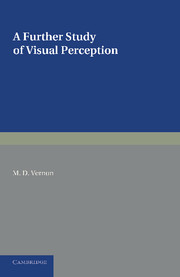Book contents
- Frontmatter
- Contents
- List of Illustrations
- Acknowledgements
- Chapter I INTRODUCTION
- Chapter II THE NATURE OF PERCEPTION
- Chapter III THE PERCEPTUAL PROCESS
- Chapter IV THE DETERMINATION OF FORM
- Chapter V SPATIAL PERCEPTION
- Chapter VI THE CONSTANCIES
- Chapter VII THE FUNCTIONS OF THE FRAMEWORK IN PSYCHO-PHYSICAL EXPERIMENTS
- Chapter VIII THE PERCEPTION OF MOVEMENT
- Chapter IX MICHOTTE'S STUDIES OF SOME INTRINSIC PHENOMENA OF EXPERIENCE
- Chapter X THE INFLUENCE OF INTERNAL AND INDIVIDUAL FACTORS UPON PERCEPTION
- Chapter XI CONCLUSION
- Appendix A
- Appendix B
- References
- Index of Authors
- Index of Subjects
Chapter III - THE PERCEPTUAL PROCESS
Published online by Cambridge University Press: 05 June 2016
- Frontmatter
- Contents
- List of Illustrations
- Acknowledgements
- Chapter I INTRODUCTION
- Chapter II THE NATURE OF PERCEPTION
- Chapter III THE PERCEPTUAL PROCESS
- Chapter IV THE DETERMINATION OF FORM
- Chapter V SPATIAL PERCEPTION
- Chapter VI THE CONSTANCIES
- Chapter VII THE FUNCTIONS OF THE FRAMEWORK IN PSYCHO-PHYSICAL EXPERIMENTS
- Chapter VIII THE PERCEPTION OF MOVEMENT
- Chapter IX MICHOTTE'S STUDIES OF SOME INTRINSIC PHENOMENA OF EXPERIENCE
- Chapter X THE INFLUENCE OF INTERNAL AND INDIVIDUAL FACTORS UPON PERCEPTION
- Chapter XI CONCLUSION
- Appendix A
- Appendix B
- References
- Index of Authors
- Index of Subjects
Summary
THE CONDITIONS OF INVESTIGATION
It is now valuable to consider more closely the details of the process by which, when the sensory impressions have reached the receptor areas of the cortex, a fully developed percept is attained. The process cannot of course be studied objectively, as the passage of the sensory nerve impulses to the cortex has been studied by Adrian (1928). Its details can be observed only by introspection, and are therefore subject to the inevitable deficiencies of introspection. Indeed, so rapid and uninterrupted is the perceptual process in ordinary everyday experience that it may appear to be a unitary and unanalysable whole. Yet, as Michotte (1926) has pointed out, this analysis can be facilitated objectively, by various methods of simplification and modification of the perceptual stimulus, or by shortening the time of exposure, as is done in using a tachistoscope. In this manner, the process can be arrested at some stage of incompletion. Alternatively the completion of the process can be retarded by making perception difficult: the stimulus field may be complex, ambiguous, unclear, or dimly illuminated. In all these cases it is necessary to instruct the observer to direct his observation to the gradual development of the percept, or to some particular stage of it. But it is important to remember that we are not justified in concluding that the process thus analysed, interrupted, or retarded, is identical with the process which would have occurred under ordinary conditions. In particular, the direction of the observer's awareness to some particular part of the process may give it an altogether artificial prominence and importance. We cannot even be sure that certain secondary attendant processes, such as imaging, may not in some cases be actually aroused by instructions to observe their occurrence. All that we can hope to do is to point to some of the phenomena which occur most frequently, if not universally, under these conditions; and to decide with greater or less assurance if they are normal and essential constituents of the perceptual process.
Information
- Type
- Chapter
- Information
- A Further Study of Visual Perception , pp. 19 - 45Publisher: Cambridge University PressPrint publication year: 2013
